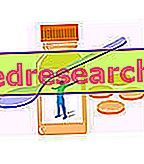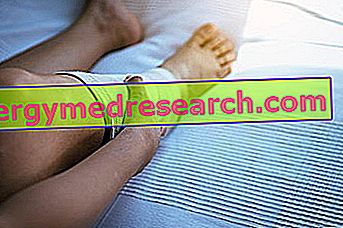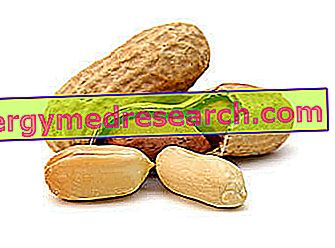Definition
Diverticula of the colon are small growths that develop along the intestinal walls, especially in the tract of the large intestine; diverticulitis delineates an inflammatory process of such extroflexions that, when cured, does not create long-term damage. In case of lack of inflammation of the diverticula, one speaks more correctly of "diverticulosis", a purely asymptomatic condition.
Causes
No precise cause responsible for diverticulitis is known; however, it is assumed that an unbalanced diet, rich in fat and low in fiber, is one of the most probable causal elements. The tendency to constipation and the difficulty in defecation represent some risk factors for diverticulitis: this seems to be explained by the increase in pressure inside the colon, responsible for the weakening of the wall in which diverticula grows. Bacterial infections can also promote diverticulitis.
Symptoms
Diverticulitis can cause severe abdominal pain, sometimes comparable to those typical of appendicitis. Other symptoms include abdominal cramps, diarrhea, fever, abdominal bloating, meteorism, nausea, irritable bowel syndrome and constipation. Complications: fistulas, peritonitis, intestinal polyps, rectal bleeding.
Diet
Information on diverticulitis - drugs for the treatment of diverticulitis is not intended to replace the direct relationship between health professional and patient. Always consult your doctor and / or specialist before taking diverticulitis - diverticulitis treatment drugs.
drugs
To avoid complications, diverticulitis must be promptly treated; clearly, the treatment of the disease depends on the severity of the symptoms and the triggering cause. Given the intensity of pain, some patients must be hospitalized; however, in most cases, inflammation tends to resolve even with a pharmacological treatment, which does not require hospitalization.
In the case of diverticulitis, it is always recommended to take large quantities of liquids and light foods, low in fat.
The administration of antibiotics is indicated to treat diverticulitis in the event of bacterial superinfections; it is possible to follow a parallel pain-relieving therapy, consisting essentially of NSAIDs and paracetamol to reduce fever, to be used with caution. In case of very severe pain, opioids may be prescribed. In some cases, the administration of intestinal antispasmodics is recommended.
Antibiotics with systemic action: they are important for the treatment of acute diverticulitis; taken orally or intravenously, antibiotics fight the bacteria involved in the disease, counteracting inflammation. It is important to remember that the administration of antibiotics should always be accompanied by probiotics, given that they are powerful drugs, capable of altering the physiological intestinal bacterial flora. Among the drugs most used in therapy, we recall:
- Ciprofloxacin (eg. Ciprofloxac, Samper, Ciproxin, Kinox), belonging to the class of quinolones. Take 500 mg orally or 400 mg intravenously twice a day (every 12 hours), for 7-10 days.
- Metronidazole (eg Metronid, Deflamon, Flagyl) the ideal dose of the drug 7.5 mg / kg intravenously, every 6 hours. Continue the therapy for 10-14 days, depending on the severity of diverticulitis.
- Clindamycin (eg Dalacin-T, Clindamycin BIN, Zindaclin, Dalacin-C ) is recommended to take the drug orally at a dose of 450 mg every 6 hours. The drug can be given together with trimethoprim or Sulfamethoxazole. For acute forms of diverticulitis, it is possible to take a higher dose of antibiotic: 450-900 mg intravenously every 8 hours. The duration of therapy varies from 7 to 14 days.
- Pharmacological associations such as Sulfamethoxazole / trimethoprim (eg Bactrim), sulfonamide antibiotic. For moderate forms of diverticulitis, it is possible to take the pharmacological combination at the dosage of 160-800 mg orally, every 12 hours, possibly in combination with metronidazole (500 mg orally, every 6 hours). The duration of therapy varies from 7 to 10 days.
Pain Relievers:
- Ketorolac (eg Girolac, Rikedol, Benketol, Kevindol) the drug is given at a dose of 30 mg every 4-6 hours. Do not exceed 90 mg / day. It belongs to the class of non-steroidal anti-inflammatory drugs. Also used to reduce fever. Alternatively, use paracetamol. Do not abuse analgesics: they may favor perforation at the level of the diverticulum.
- Opioids: in the context of diverticulitis, opioid drugs must be used with extreme caution, since they can cause constipation, aggravating the problem of diverticulitis.
Surgical therapy:
Rare, albeit possible, cases of failure to recover from diverticulitis following drug therapy; in this case, surgery is essential. The surgery involves the excision of the intestinal area affected by diverticulitis, essentially responsible for pain and difficulty in defecation.
Notes : simple rules to prevent diverticulitis or speed up healing
- Don't drink alcohol, coffee, tea
- Take plenty of non-carbonated liquids
- It is possible to take plant extracts that stimulate intestinal function (eg psyllium)
- Play sport
- Follow a light diet, abundant in fiber and low in fat → the fibers are health-friendly: they prevent diverticulitis and stimulate intestinal peristalsis



